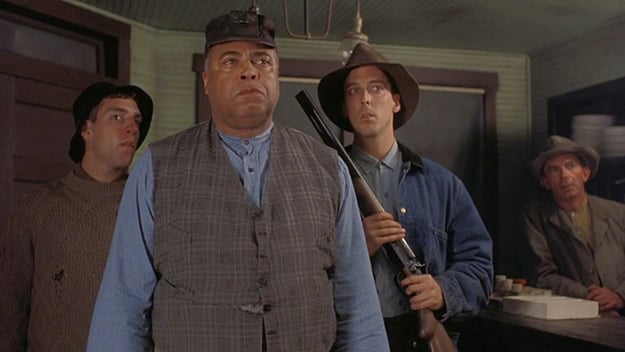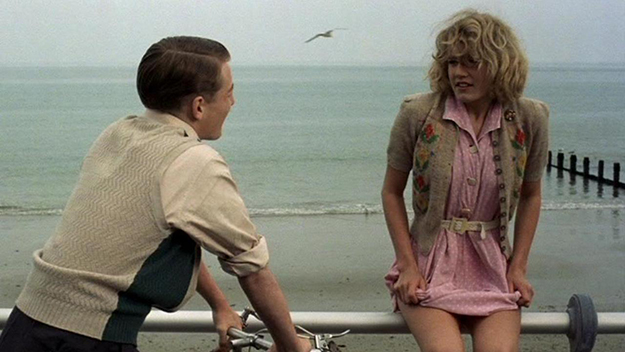Matewan John Sayles’s Matewan, an intricately scripted and historically nuanced drama about the insurrection of coal miners in 1920 West Virginia, might have been the best U.S. film to premiere at Cannes in 1987. (Something Wild and Raising Arizona, booked into out-of-competition midnight screenings, were even more vivid and daring, but each had already entered commercial release back home.) But to savor this ambitious convergence of labor politics, racial legacies, and multiethnic tensions, or marvel at Haskell Wexler’s textured resourcefulness in filming gunfights in pitch-black woodlands, festivalgoers that year had to plumb the Directors’ Fortnight section. By contrast, Paul Newman’s primly straightforward take on The Glass Menagerie and Andrei Konchalovsky’s barely controlled bayou soap opera Shy People qualified for the Main Competition. Exacerbating this imbalance, Shy People snagged a Best Actress prize for Barbara Hershey (fiercely committed to her film’s shaky premises), while Matewan’s reels weren’t even projected in the right order. Every Cannes yields intractable puzzles about how festival brass has slotted the films and, by implication, differentially valued them. Granted, top dog and underdog status can shift over time; today Matewan retains some critical and classroom prestige while The Glass Menagerie and Shy People never even materialized on North American DVD. Still, why would a festival so enamored of expansive national allegories extend second-class treatment to the U.S.’s only stab that year at refracting the present through the past, via a cross section of symbolically coded characters? Cynics might point to the brand names involved: Sayles’s profile was still emerging in 1987, whereas Newman and Tennessee Williams carried canonical resonance, and Shy People producer Menahem Golan, the central figure in Ebert’s book about Cannes ’87, had snuck shakier movies than this one into Competition slots. The more disquieting possibility is that Yeelen or Blind Chance or Wings of Desire, lauded by foreign spectators for their bold style and thematic brio, might look as awkward or overblown to their hometown audiences as U.S. spectators would likely find Shy People, a Russian director’s hyperbolic staging of a French-authored screenplay about crass Manhattanites on a harrowing sojourn in the Louisiana swamps. Then again, the latter was Ebert’s favorite of the festival. Chacun son cinéma. If the American offerings were uneven, the British slate was even more tepidly received—regrettably, since Prince Charles and Princess Diana, not necessarily in that order, made a big splash on the Croisette to support the U.K.’s productions, which look even more underwhelming in retrospect. Pre-festival buzz had positioned Stephen Frears’s Prick Up Your Ears, about the sudden celebrity and sordid death of playwright Joe Orton, as the gem of that year’s English crop, but Frears shows little feel for his characters’ seamy milieu. The fragmented, flashback-based structure of Alan Bennett’s script clutters more than it reveals, and in tone and insight, the performances are all over the map. Like its compatriots in Competition, The Belly of an Architect and the opera-inspired omnibus Aria, the film earned no prizes. Still, even a disappointment like Prick Up Your Ears rates higher than Pat O’Connor’s A Month in the Country, an Irishman’s sentimentally emerald vision of Yorkshire, and a stiff showcase for Colin Firth, Kenneth Branagh, and Natasha Richardson before they found their footing as film actors. Lindsay Anderson, the most established British director at Cannes, helmed the U.S. production of The Whales of August, intended as a valedictory valentine to aging stars Lillian Gish and Bette Davis. Sadly, it’s a damp doily that makes On Golden Pond look like a Joe Orton play.
Wish You Were Here The only U.K. entries worth preserving were zesty character studies about young lasses sleeping with older, highly dubious men: Wish You Were Here, David Leland’s post–World War II dramedy that briefly made a star of radiant Emily Lloyd, and Alan Clarke’s Rita, Sue and Bob Too, a contemporary sketch about two feisty teenagers taking turns with the same unctuous dullard in a very different Yorkshire from Pat O’Connor’s overlit glade. At first, I craved a bit more polish from Rita, Sue and Bob Too —conceived by another star-crossed British playwright, Andrea Dunbar—but Clarke’s feel for his brash characters and their dead-ended but still vivacious environment won me over, as did the film’s refusal to oversell its stakes or pander to prestige audiences. I see why it remains a cult favorite, especially at home, even if Croisette reporters barely noticed it. A sure grasp of very specific times and places, a curiosity about women’s lives, and a disdain for inflated drama connect these scrappy English yarns to the most durable crowd-pleaser that emerged at Cannes, unlikely as that linkage might seem. In the 19th-century Danish fable Babette’s Feast, adapted by director Gabriel Axel from Karen Blixen’s short story, you can practically smell Jutland’s salty coast and feel the chill of romantic disappointment shared by devout spinster sisters Filippa and Martine. The film is a markedly sensory experience, then, even before the titular, climactic meal, which is lit, framed, and designed to convince us we are tasting amontillado and cailles en sarcophage. Hardly subtle about stoking our gustatory desires, and eager to flaunt some magic-hour photography, Axel shows an impressively soft touch elsewhere, leaving Babette’s tragic backstory offscreen and conveying a collective, pleasure-based epiphany while respecting the characters’ fundamental reserve. I admire all this about Babette’s Feast, which might well have won the Palme if the powers that be hadn’t programmed it in Un Certain Regard. Later it would swipe the Best Foreign Language Film Oscar from Ettore Scola’s The Family, a handsome but hardly innovative Italian drama in the Main Competition, and from Louis Malle’s Au revoir les enfants, that year’s Golden Lion winner at Venice. If Babette’s Feast has never been a personal passion, I suppose I prefer more meat on a movie’s bones—or, maybe, a different bird in its sarcophage. Happily, for viewers like me, the day after Babette’s Feast bowed, Palestinian luminary Michel Khleifi unveiled Wedding in Galilee, another multi-character drama that culminates in a grand feast, but one with bolder questions and more ideological tensions on its mind. The premise is nervy enough: an Arab family invites the Israeli military governor to their son’s all-day wedding; in exchange he will waive the curfew imposed by the occupying authority. Some of the hosts and guests see a chance for cross-cultural bonding—including through food, which the Israelis deem better than what they sampled in Lebanon, but not as good as in “the glorious city of Aleppo,” a line that now puts a lump in your throat. Other factions at the reception plot a violent revenge. The groom, meanwhile, seems distracted and the bride weirdly solemn, even as their bodies are ceremonially plucked and scrubbed by joyous, doting peers. They are both, for different reasons, uneasy about how things will go in the conjugal bed—especially since the entire party outside expects to see a blood-spotted bedsheet before they all go home.
Wedding in Galilee Wedding in Galilee locates irony, danger, subterfuge, and the possibilities of friendly collusion in public and private spaces. Like most of Khleifi’s work, the film blends folkloric and documentary elements, exhibiting a sense of contemporary urgency but also a knack for mythic storytelling that eludes Konchalovsky and even Sayles, who reach for such resonance in their very different ways. Booked near the end of a top-flight Directors’ Fortnight, where it shared a FIPRESCI Prize with Wish You Were Here, this engrossing, combustible tale might also have swiped the jury’s top prize had they seen it. Alas, with only Yeelen and Dark Eyes making waves in the festival’s first week, the Main Competition was still awaiting a movie to rival the peaks in its ostensible sidebars. Nick Davis is a professor of film, literature, and gender studies at Northwestern University. He also writes film reviews at www.NicksFlickPicks.com.


